Click on images for full view.
Kristen Stewart's dog doesn't care about movie stars. All that Cole — a rescue mutt ecstatically flinging her stocky little body across the lawn of a vast Malibu estate on this broiling early-September afternoon — wants to do is chase the grubby tennis ball that the actress obligingly keeps tossing between clicks for EW's cover shoot. She's certainly the only one here (and likely far beyond this rarefied zip code) to be blissfully unaware of the oceans of real and digital ink spilled over her owner in the past dozen or so years — the relentless, reflexive obsession with Stewart's roles and clothes and love life, the color of her hair and the state of her career.
It's tempting to draw a line from the 31-year-old Los Angeles native to the late Princess Diana, whom she portrays in Spencer (in theaters Nov. 5): two young women, pinned like butterflies beneath the smothering bell jar of celebrity. But the movie, helmed by lauded Chilean filmmaker Pablo Larraín (Jackie), is much trickier and more ambiguous than that — an intoxicating art-house swoon of ghost queens and scarecrows and tumbling pearls, pegged to a central performance all the more remarkable for its real-world nuance and vulnerability. (Following the world premiere at the Venice Film Festival the first week of September, talk of a sure-thing Best Actress nod quickly reached fever pitch.)
Stewart, at least, is reluctant to overplay any parallels to her muse: "I mean, I've tasted... I've come near these sort of manic levels of fame and intrusion," she admits a few days later at a hotel lounge in Telluride, Colo., after the film's North American bow there, gamely inhaling a cappuccino to ease her Italian jet lag while bossa nova versions of Adele and Bon Jovi songs tinkle incongruously through the high-altitude air. "Not intrusion," she quickly corrects herself. "That implies that I've been stolen from in this violent way. I have experienced people kind of wanting to come in, but there is no comparison to this particular woman, in terms of that fervent desire to have her and know her."
Indeed it's startling nearly 25 years after her death, the degree to which the Princess of Wales endures in pop culture — the currency of countless books and fashion bloggers and, perhaps most famously, the latest season of Netflix's prestige royal soap opera The Crown. (Stewart is a fan: "I watched it probably in one night. I think [actress Emma Corrin] did a really beautiful job. I mean, not to say that my opinion matters at all!" she adds, laughing. "But I loved her in it, truly.") Only 7 when Diana died, Stewart hardly considered herself among the faithful. But when Larraín reached out and offered her the part, "I knew even before I read the script. I was like, 'You're not going to say no to this, because who would you be in that case?' I absolutely would have felt like such a coward. Especially given that I'm such an outsider. I'm not from the U.K., I don't have any particular investment in the royal family. So I was kind of this really clean slate, and then could absorb her in a way that actually felt very instinctive, you know?"
"We all know a lot about Diana, whether you are more or less interested," says the Santiago-born director, 45, of his deliberately unconventional approach to the story. "You have to work with that, and you know that. She's already an icon, so you need to start from that base. And then we go and choose a very precise moment of her life that could define who she was in a very simple way, or at least try to... To me, it's a very universal Greek tragedy in its shape and basis, a classic structure. That simple element is what I think we were attracted to."
The screenplay by Steven Knight (Peaky Blinders, Allied) sets its parameters accordingly, confining the timeline to an unspecified Christmas holiday at the Queen's country estate, Sandringham, most likely within a year or two of Diana's final rupture with the House of Windsor in 1992. The princess has defiantly driven herself there alone, the first of many minor rebellions that will play out over the next three days of forced-festive pageantry in myriad ways — some of them almost comically small for a woman of such supposed privilege and power. "It is a fact that sometimes she just didn't want to come to dinner," Stewart says. "And if that's all you've got, if you're backed into a corner and the only way to bare your teeth is to change your clothes or not come to eat... If you're so voiceless and never listened to and never asked any questions, you're going to do things in order to be heard that are very easy to judge."
And judge they do: from a sniffy, faintly derisive Prince Charles (Jack Farthing) to the chambermaids, pages, and guards who scurry past, taking note of every feint and misdemeanor. Her lone allies, seemingly, are a devoted dresser (The Shape of Water's Sally Hawkins), a sympathetic chef (erstwhile Mission: Impossible villain Sean Harris), and her own young sons, William and Harry (played by Jack Nielen and Freddie Spry). Even before she pulls into Sandringham's grand driveway she's begun to spiral, her emotional state exacerbated by the proximity of her shuttered childhood home — a hulking, haunted presence located just yards away.
But after years of enduring the royal gauntlet, Diana is not without her own bag of tricks; Stewart quietly nails the dipped chin, widened eyes, and soft, plummy cadences behind which the princess often concealed a steely will. "She's such a strange combination of things that don't seem to go together," the actress says. "The power she pulls into every room is probably what was so upsetting for people who wanted a sort of demure and quiet figurehead.... She was just tactile and warm and kind of buzzing with fragility that needed to be pacified and salved."
Indeed, beneath the couture swirl of jewels and gowns and netted hats, she moves through this cloistered world like a walking wound: heartsick, furious, desperately lonely. Though Stewart has been identified mostly with contemporary roles, Larraín saw qualities in her, he says, that recalled another era entirely. "It's a combination of something that feels elegant and truthful and strange and enigmatic and magnetic," he says. "All these spaces [at Sandringham], most of the furniture and the rugs and the curtains and the fabrics and the colors, the lighting, it's been like that for centuries. But if you take those elements out, it's a little bit out of time. The main element for that timeless feeling was Kristen."
As much as the film's narrative tends less toward traditional biopic structures than what Stewart calls a "distillation" and "a long tone poem" — one that includes, among other things, a soup-related hallucination and the ghost of Anne Boleyn — her performance is still rooted in real, painful truths. To find that essence, the actress leaned heavily into research, working with famed dialect coach William Conacher (who also trained Corrin and Naomi Watts for their respective screen Spencers) and immersing herself in piles of Diana lore.
Even then, she says, "there are contradictory materials from the horse's mouth. She doesn't always say the same thing in every interview, you know? There was a fickle nature, obviously, to a lot of the facts. She is, very sadly and very ironically, one of the most unknowable people in history, when all she wanted was to just be closer to people and bare herself." Whether or not the result is note-perfect, "there was something just in absorbing her completely over the last six months leading up to this. I knew that I had hit some kind of elemental energy. If people have a lot to say about it not being a perfect impression, that's so okay with me."
One fight Stewart wouldn't win: using her real hair. That bit, she concedes, was inevitable: "If it wasn't a wig, we would have had so much less time to shoot," she says of the four months spent on location in Germany and England earlier this year, with a stripped-down mid-pandemic crew. "And we were f---ing sprinting. This was not padded or luxe in any way. We were balls to the wall, gunning through it. Which you can feel in the movie 10 or 15 minutes in— once it gets up and starts going, it doesn't stop, it barrels. It felt that way to make it, too." (Indeed, Knight's script is so streamlined that nothing landed on the cutting-room floor, Larraín confirms, beyond small trims in dialogue.)
Though Stewart is only just entering her 30s, her career path reads more like a marathon than a sprint: Born into the business — her mom worked as a script supervisor for years, her dad as an assistant director mostly for TV, and her older brother is a grip — "I inherited a real love of the circus," she says. "My parents worked constantly, but I never felt that they were absent. I was always rifling through their bags for craft service and just wondering, 'What did you do all day?'" At 9, she got her first taste as an extra in The Flintstones in Viva Rock Vegas, but confesses, "I was really not good in commercial auditions at that age. I was not the type for it at all. And it was physically, viscerally painful to be criticized for not being able to dance in pigtails."
That began to change with her casting as Jodie Foster's daughter in the taut 2002 David Fincher thriller Panic Room; a string of roles — mostly in small Sundance-y indies — followed, before a certain iridescent-vampire franchise went nuclear. Post-Twilight, she found more multiplex success with 2012's Snow White and the Huntsman and won praise for supporting turns in low-key Oscar bait like Still Alice, but it was her work with Gallic auteur Olivier Assayas on the moody metaphysical dramas Clouds of Sils Maria and Personal Shopper that seemed to mark a turning point. (Stewart remains the only American actress to ever take home a César, the French equivalent of an Oscar, for Sils Maria.)
To promote Shopper in 2017, she hosted Saturday Night Live for the first time. That episode — in which she crisply eviscerated the 45th president's baffling obsession with her dating history, made an entire nation rethink their relationship to Totino's Pizza Rolls, and declared, "I'm like, so gay, dude," to wild cheers — felt like a revelation for a star many seem to picture as a sort of celebrity sphinx, a too-cool-for-school enigma wreathed in kohl eyeliner and ennui. "I think sometimes you get lucky. There are certain magic episodes," she says, deflecting credit. "But it's so funny, this pervasive idea that I'm just this f---ing little freak. Because I think my friends think I'm funny! I mean, I crack them up all the time. I just got jobs that weren't like that."
In person, actually, she's fantastically uncool — an elbow squeezer and quick laugher, wry and goofy and so earnestly, f-bombingly sincere, even in the face of questions she has undoubtedly answered to infinity, that she makes most actresses' press tours feel like plastic-wrapped performance art. (She seems to live an actual life off screen, too — giving off the energy of a friend who would happily spend a lost afternoon playing darts with you at a bar, but also be a conscientious member of your book club.)
She let some of that more playful persona come through in a 2019 Charlie's Angels reboot and last year's queer Christmas rom-com Happiest Season, which became an unlikely hit on Hulu. The actress is not unaware of how Spencer's reception may change her ranking in the Hollywood bracket game, and not ashamed to admit she cares: "You want to win, we're all animals," she says matter-of-factly. "Artists want to engage with the world and have larger conversations. Even though it doesn't seem like I'm somebody who wants to be extremely famous, I still want this conversation to be expansive.... I used to be really intentionally the opposite of precious in terms of choosing projects. For a minute there I was like, 'I'll do f---ing anything!' And honestly, it was a good place to be for a minute. But I think now I'm going to be a little more careful. I think I have a better nose for what's going to be fruitful for me personally, as an experience, if not necessarily what's going to thrive out in the world."
On deck next is a David Cronenberg film called Crimes of the Future costarring Viggo Mortensen, and a high-concept sci-fi drama opposite Minari's Steven Yeun. ("It's actually a love story between a satellite and a buoy; it's hard to explain. I hope I don't botch it, because it's a really revolutionarily written script.") There's also a long-gestating adaptation of The Chronology of Water, based on the harrowing 2011 memoir by Lidia Yuknavitch, that she plans to direct, but wants someone else to star in. ("I can't wait to throw somebody into, like, the deepest, coldest, scariest water and see what happens to them," she grins wickedly.)
It's hard not to think of that little girl who couldn't vamp in pigtails at auditions when Stewart speaks of one of Spencer's most indelible scenes — a dizzying montage in which Diana whirls across the estate in a sort of mad, feverish trance, trailing tutus and satin and, at one point, even the meringued pouf of her own wedding gown. Larraín kept a wardrobe rack on standby, and a playlist he would choose from at will: Miles Davis, LCD Soundsystem, Talking Heads. "At the end of every single day," she remembers, "there was 30 minutes of extra time to pick an outfit and for Pablo to pick a song in a room and just go. He said, 'Because we're not doing everything chronologically, we're not doing a biopic, this is your chance to tell the whole story. All you need to do is inhabit the space and listen to the music and carry her with you, and everything you know about being in this place, and just see what happens. See if it comes out.'
"The first time, I didn't want to do it. I'm such a control freak I was like, 'I need to know what I'm doing. I want to be prepared for what I'm doing!' But I came down these stairs, and I know it sounds so silly and esoteric, but it felt so f---ing spiritual and so spooky, and I was so overwhelmed by the feeling of her. And I don't mean like ghosty stuff. I just mean everything she's made me think and feel, and it all just kind of happened in a moment. I was like, 'You were so right. You're so right about this.'" She kept dancing.
Kinda Blue
When director Pablo Larrain first approached Kristen Stewart for the role of Princess Diana in Spencer, she'd only seen his 2016 arthouse sensation Jackie. But "the confidence in which he said he wanted to do it with me," she says. "His ego had nothing to do with it. He really laid himself out. I haven't even read the [script], and I was like, 'Absolutely.'"
Blond Ambition
I think he was kind of nervous about my research consumption," she admits of Larrain, whose vision involved a more abstract and impressionistic take on the late Princess of Wales. Still, Stewart threw herself into the deep end: "I knew I had the ability to pick and choose and really get a well-rounded impression and not be sort of laid in, or tripped up or overwhelmed."
Like A Boss
From the outset, Larrain had faith in her interpretation: "I mean, I'm paraphrasing and probably oversimplifying," she recalls, "but he would say, 'If you get one or two little things right, just be yourself from there on. If you just get the accent right, and the wig looks good, you don't need.
Splendour in the Grass
Still, Stewart says, "Had I not read everyone's opinion and looked at every picture and just sort of felt the loss of her every day — because she feels so alive in every picture, and she really does, like bust out of every interview — I wouldn't have cared the same way. I wouldn't have had the emotional or physical artillery to bring to set."
Walk the Line
Yes, Stewart has seen The Crown. (And loved it). But she likes to think that Diana would have appreciated seeing more than one version of herself on screen: "She was so obsessed with connection and people, and she really had such an overwhelming humanity, I think that she believed.... Well, let me put it this way: It's more fun for me to believe that she would believe in a sort of multiplicity of art, and that she still exists [in part] because we're all obsessed with her."
In the Slipstream
"I don't know whether or not I would prefer to be pre- or post-internet," Stewart admits, of the way fame has evolved since Diana's time. "If you feel isolated and marginal or misunderstood, it's very easy now to connect with people that are like you. But having said that, you're then also exposed. And I don't even mean celebrities, just anyone that uses the internet — kids, young girls that are f---ing sensitive and their brains are still developing — everyone's open to extreme criticism. But at the same time, we're also open to feeling the alleviation of connection."
Earning her Stripes
Stewart was still a teenager herself when Twilight fame turned her into sudden, constant fodder for the tabloids. "It made me a stronger person," she acknowledges. "And when I say stronger, I don't mean harder. Having said that, no, it was not fun. But I'm not mad at anyone for any of it, do you know what I mean? I kind of understand all of it. And not that I think that I'm in a position to be resentful of the spot that I'm in. It's just that I don't pay a lot of credence to it."
Back to the Garden
"This is all very ambiguous and weird to talk about," she goes on, of her own celebrity. "But I kind of was able to... If you don't look at it, it doesn't exist. It's this ephemeral idea, actually. Luckily, I kept working, so it was fine. If it had actually affected my job, it would have really been a bummer. But I never had a public Instagram, I've never really interacted personally with it. It's only ever broken through while I'm doing interviews, promoting movies, talking to people that write these articles."
Coming Up Roses
"I did indies in between each Twilight movie," the L.A. native says of her career trajectory, which has ranged in recent years from the acclaimed French meta-drama Clouds of Sils Maria , for which she won the French equivalent of an Oscar, to a leading role in 2019's big, shiny Charlie's Angels reboot. "And I'd always [say] 'Oh, I'm just instinctively navigating my career." And it is true, but there have been a few things that I've chosen because I'm like, 'Yeah, maybe we do a big thing now.' Just to see if it works. And sometimes it doesn't!"
Unchained Melody
"Like everyone, Stewart went through her own pandemic phases: "I got very drunk," she says of her early days in lockdown. "Then I stopped drinking, got really good at pool. and read a lot of news, back when we were all just stress reading the news and couldn't focus on anything else.
A Novel Perspective
"Something about being locked inside without knowing how long it was going to be actually kind of paralyzed me a little bit," she admits. Scripts — and books — helped open her world back up: "Once I started working, I started reading again. I blew through the Anne Boleyn books. I read Sapiens finally, which was sitting on my nightstand for f---ng five years."
Into the Light
"Once I was forced to step out again," Stewart says, "The perspective I gained from that locked-in feeling, I had this really beautiful hunger. I almost feel like I went to sleep and opened my eyes and was five years older and smarter and just more engaged." And then? She smiles. "And then I got to start working on Diana."
Photography by Lauren Dukoff for EW. Look 1: Dorothee Schumacher beige top and trouser, Garrett Leight sunglasses. Look 2: St. John's blue sweater bra and legging. Look 3: Stella McCartney pink biker shorts, white blazer, and sequined dress; Christian Louboutin pumps; Garrett Leight sunglasses. Look 4: Peter Dundas pink and white suit, Stella McCartney pink lace bike shorts. Look 5: Fa Noel pink slip dress.
Source: EW and Lauren Dukoff


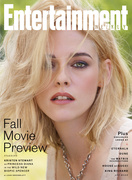
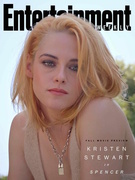
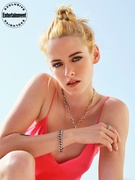
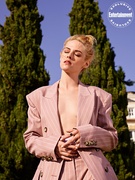
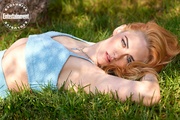
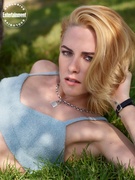
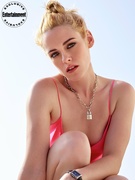
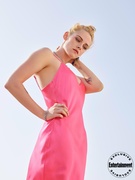
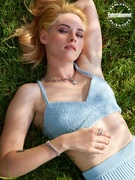
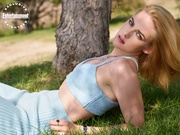
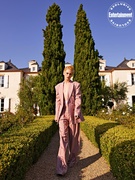
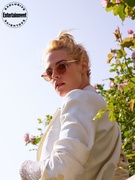

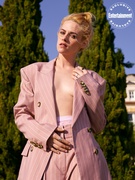
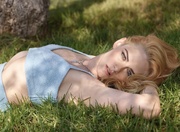
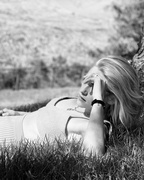
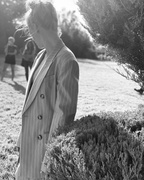
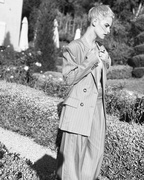
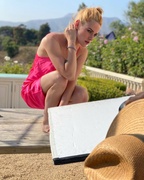
No comments:
Post a Comment
What do you think of this?